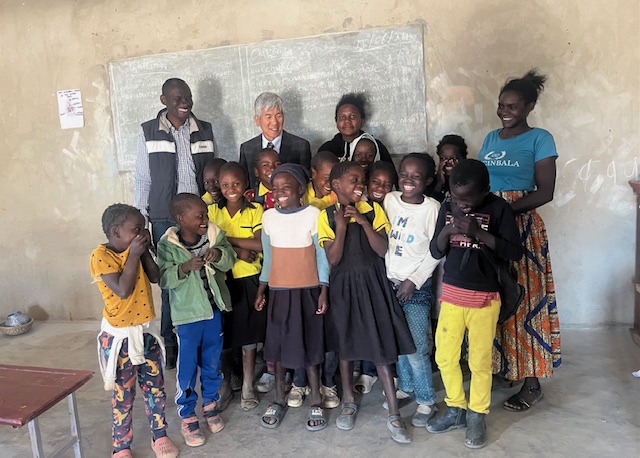学校給食提供の背景と概要
南部アフリカ地域では、2023年末から2024年初旬にかけての雨期の降水量が例年の20%程度に留まった影響で、穀物の収穫量が大幅に減少し壊滅状態にある地域も多い状況です。当団体代表の吉田修が、5月に現地調査したところ、農家の食料貯蔵庫はほぼ空でした。次の収穫は2025年4月頃で、それまで食料がないことを意味しています。また、干ばつに加え、昨今の国際情勢を背景として世界的に燃料費や肥料価格が値上がりし、食料価格も高騰し、深刻な危機に直面しています。
学校給食の支援は、現地NGO Kocebuka Community Foundation(KCF)に実施を委託し、2024年9月1日から、Mutaba Community Schoolの生徒(118名)に対して週5日行います。委託費で食材を購入し、準備や食材の管理は地域住民が、調理はPTAの協力を得て、給食の提供を予定しています。
なお、現地の状況によって、支援の期間に変更が生じることもあります。
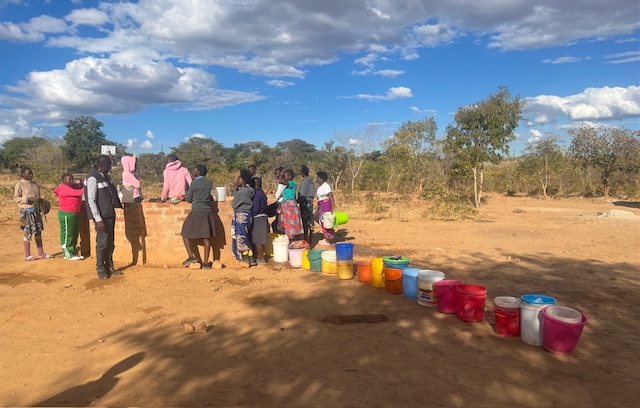
事業完了報告書
エグゼクティブサマリー
2023~2024年の農業シーズンに発生した壊滅的な干ばつは、最終的にザンビア全体の116地区のうち84地区に影響を及ぼす国家的災害と宣言されました。特にザンビア南部州では、ほとんどの農村世帯が作物生産に収入と食料安全保障を依存しており、85~100%の収穫に失敗したこの干ばつは、COVID-19の余波から立ち直りつつあった地域にとって極めて深刻な打撃となりました。
国家的な災害宣言と人道支援要請を受けて、コセブカ・コミュニティ財団(KCF)は迅速な評価を実施し、この干ばつが学習者に与える影響を調査しました。予備的な調査結果では、特に代替生計手段のない低所得世帯の学習者において、学業成績や出席率の低下、さらには退学の可能性が示唆されました。
この迅速な評価はTICOに共有され、学習者を対象とした対応策の必要性が提案されました。その後、TICOと合同でコミュニティースクールを対象とした現地調査が行われ、食料や収入の不安が高まる中での脆弱性を確認しました。その結果、最も支援を必要とする4校が特定され、さらに優先度を付けた結果、ムタバ・コミュニティースクールが対象校として採択されました。ここで3学期にわたって、全児童に毎日の学校給食を提供するプロジェクトが実施されることになりました。
給食プロジェクトを監督するため、地域社会と学校運営の合同運営委員会が設置され、地区教育委員会、地区行政事務所、地方自治体から必要な認可を取得しました。
地域住民は毎日の労働(給水、薪集め、調理、配膳)および夜間の警備を担うことを約束しました。
TICOは、給食プログラムに対して月額800米ドルを支援することを約束し、合計9か月間で7,200米ドルをKocebukaコミュニティ財団に送金しました。計画された3学期の期間中、最大159名の児童が毎日給食を受けた。学校には食器、米、ピーナッツバター、砂糖が寄贈されました。
主な成果
- 出席率の向上:児童が月曜から金曜まで安定して登校するようになった。
- スポーツ活動の増加:給食を待つ間、児童が自主的にスポーツに参加するようになり、交流や一体感が深まった。
- 再入学の増加:給食を目当てに再び学校に戻る児童が増えた。
- 学業成績の改善:児童がより集中し、積極的に授業に参加するようになった。
- 保護者と教師の関係改善:地域の男性は食品保管庫を建設し、女性は調理に参加するなど、保護者の学校活動への関与が深まった。
- 退学者ゼロ:プロジェクト期間中、退学者は一人も出なかった。
- 水と衛生環境の改善:手押しポンプ式井戸を掘削し、学校および隣接する約30世帯に清潔な飲料水を提供。
- 学校と地域の協力強化:教育活動と地域活動の連携が深まった。
- 栄養不良リスクの軽減:給食により栄養状態が改善された。
プロジェクトのハイライト
・家庭への食料・収入面の支援効果:家庭での食事消費量が抑えられ、支出の軽減につながった。
・児童の体重が安定または増加:学期開始時と終了時に測定した体重は、平均0.5~1.5kgの増加を記録し、体重減少者はゼロだった。
地域と児童の声
- ビューティー(6歳):「毎日学校でおいしいごはんを食べられるのが楽しみ。食べた後は授業にも元気に参加できる」
- ベナード(小学4年生):「学校で食べさせてもらえるので安心して授業に集中できます。本当に感謝しています」
- ジュディス(小学3年生女子):「学校で食べたとき、必ず弟や妹のために少し残して持ち帰ります」
- ジェニファーKさん(保護者):「このプロジェクトのおかげで家庭の負担が減りました。家のわずかな食料は未就学の子どもたちのために使えるようになりました。学校に通う子はお腹いっぱいで帰ってくるので、家で食べる量も少なくて済みます」
- 校長先生:「このプロジェクトは学習者の進級を大いに支えました。干ばつの影響で出席率や集中力の低下を心配していましたが、給食導入後は子どもたちの意欲が高まり、授業外活動や協調性も向上しました。また、井戸を掘削していただき感謝しています。これまで3km離れた水場まで歩いていたのが、校内で水を得られるようになり、衛生環境が大幅に改善しました」
結論
この学校給食プログラムは、学習成果の向上と児童の成長を大きく後押ししました。結果として、学習の遅れや退学を防ぎ、159人の児童に直接的な恩恵をもたらし、さらにその家庭約48世帯に間接的な支援を届けました。
作成者:パスウェル・ニャンベ(事務局長)
レビュー:デボラ・ムクロ(プロジェクト担当官)
Executive Summary
The devastating drought of the 2023-24 agricultural season which was eventually declared a national disaster affecting 84 out the total of 116 district In Zambia was an extremely difficult time for most households especially in Southern Province in Zambia. With the majority of rural households dependent on crop production for their income and food security, the drought which resulted into between 85-100% crop failure for most households particularly in Zimba was a breaking event for the community that was just recovering the aftermath of COVID 19. Following the declaration of a national Disaster and the subsequent appeal for humanitarian Support, Kocebuka Community Foundation carried out Rapid Assessment to determine the possible effects of this drought on the learners. Preliminary findings indicated a possible drop in both class room performance, attendance and drop out especially among learners from low-income households without alternative livelihood sources. This rapid assessment was shared with Tokushima International Cooperation (TICO) for possible collaboration and partnership and recommended learner focused mitigation interventions. Consequently, a joint field appraisal was undertaken targeting community schools to generate basic data on the prevailing vulnerabilities in light of the rising food and income insecurities. Four Schools was identified as most vulnerable and in need of urgent humanitarian food support. Through an elaborate ranking process, one school (Mutaba Community School) was adopted and a three terms support project was to provide daily supplementary feeding at school for all learners. A series of stakeholders and community mobilization meetings were undertaken to work out the project implementation modalities. A joint community and school administration steering committee was set up to oversee the feeding Project.
Relevant authorization was obtained from the district education Board, District administration Office and the Local Authority.
The community committed to provide daily Labour (drawing Water, firewood collection, food preparation and daily sharing) and also providing night security
Tokushima International Cooperation (TICO) committed to provide monthly USD 800 dollars support towards the feeding Program. A total of USD 7200 was successfully remitted to Kocebuka Community Foundation (KCF) representing 9 months feeding support. A peak total of 159 children were daily fed for the duration of the planned 3 terms. Plates, Meal rice, Peanut butter and sugar and were donated to the school.
Key outcomes
- Improved school attendance- there is comparative overall improvement in the school attendance for pupils. All the pupils generally come to school Monday through Friday.
- Increased School sports- Unlike before, pupils always engage in voluntary sporting activities especially whilst waiting for the meals to be served. Those who end their classes earlier tend to engage in sporting activities together with those who come earlier for their classes. This has also promoted social cohesion and blending for them.
- School re-entry- more pupils have continued to seek re-entry due to the feeding program.
- Improved class performance- Teachers have reported that children are more alert, more participatory and attentive during classes.
- Improved Community Teachers relationship- parents have been deeply involved in the school activities through the feeding program. Men have been building the school storage room where food supplies will be secured. Women have consistently been participating the meals preparation Monday through Friday.
- No Drop Out- children have continued to attend classes without anyone reported to have dropped out.
- Improved water and Sanitation (The Project also facilitated the provision of water by drilling a hand pump) Providing access to clean drinking water to the school and an estimated 30 households bordering the school.
- Improved school and community collaboration
- Vulnerability Risk reduction to Malnutrition
The project was lauded and endorsed by government as part of the Multisectoral Disaster response. Local Government departments such the district administration, Department of Community Development and Social services, Education and Health commended the effort and intervention as timely and responsive to the need at hand. Community leadership structures provided local leadership support and oversight.
Project Highlights
The Project provided extra benefits to households and relief during this difficult time. Due to income and food insecurity, children who attended school reduced daily food intake at home thereby lowering overall food expenditures.
Pupils recorded overall weight stability and increase in most cases. A comparison of weights taken and commencement and expiry of school terms showed slight average weigh gains of between 05-1.5 kgs across the board. No child recorded a weight reduction.
Community and Pupils voices
We conducted randomized project feedback survey from pupils and parents. The following were the voices:
Beauty, a 6 years old pupil had the following to say,” I always look forward to the school days as they provide us with nice food. I participate actively in class because I am happy after eating”
Benard a grade 4 pupil had the following to say,” We are very grateful for this support of feeding us whilst at school. We have no worries and we come to school with a focused mind.
Judith a grade three girls said the following, “Every day I come to school, I make sure to spare some food for my younger brothers and sisters at home”
Mrs. Jennipher K, a parents had the following to say,” this project has greatly relieved my household burden. The little food I have home carters for the non-school going children. I have no worries with the school going children Even when they come home, they eat very little food as they come back satisfied”
The Head Teacher had the following to say, “the project has contributed immeasurably to sustaining our learner’s progression, we anticipated a drop in overall school attendance, classroom performance and attention as result of the hunger situation. Following the introduction of this project, our pupils have exhibited a high esteem, hyperactivity outside classroom and increased cohesion and support to extra curricula activities.
Additionally, as a school we extend our gratitude for the Borehole that was drilled. Instead walking up to 3 kms to the nearest water point, now we have water within our premises. This has improved our access to clean water and sanitation”.
Conclusion
The school feeding program has greatly contributed to learning outcomes and projected growth in pupils’ progression. The highlighted results prevented the pupils from classroom/learning regression, a situation that could have impacted their lifelong learning. The project had a direct positive impact on 159 learners and an estimate indirect impact on their more than 48 households.
Prepared by: Passwell Nyambe ( Executive Director)Reviewed by: Deborah Mukulo(Project Officer)
ザンビアでの干ばつ支援:給食支援に加えて、学校に井戸完成!
ICOでは、エルニーニョの影響による南部アフリカ地域で発生した史上最悪規模の干ばつにより、水源が枯渇し、深刻な食料危機に直面している子どもたちに対する人道支援として、ザンビア共和国 南部州Zimbaで活動する現地NGO Kocebuka Community Foundationと学校給食の提供について業務委託契約を締結し、現地のCommunity School(政府の援助がない学校)1校において学校給食を昨年9月より提供しています。
また同校には水源がなく、学校から3キロ離れたところにある井戸まで毎日水汲みに行かねばならず、生徒への水提供など色々と問題がありました。これを受けてTICOではさらに井戸を提供することを決定、井戸掘削を行い手動ポンプ等を設置して施設が完成しましたので、今回視察をいたしました。
地下深くから汲み上げられる水は清らかで、子供達も我先に水を飲んでいました。健康衛生に欠かせない水源の提供に、学校及びご父兄、そして地域の皆様からも多くの感謝のお言葉を頂戴しました。
今後は学校側が管理を行い、修理点検等も随時行うことで、生徒と地域の皆様に活用してもらうことを想定しています。
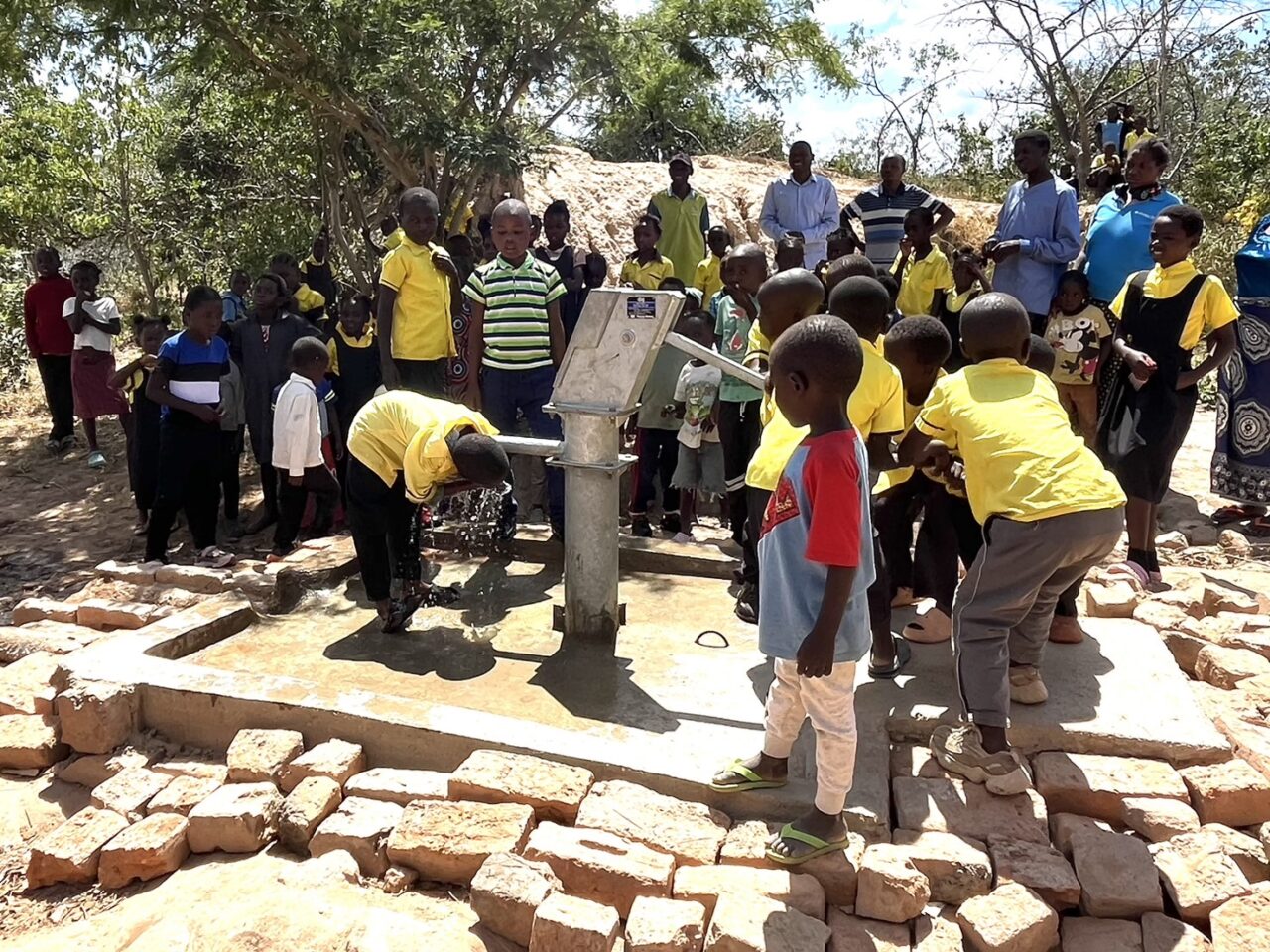
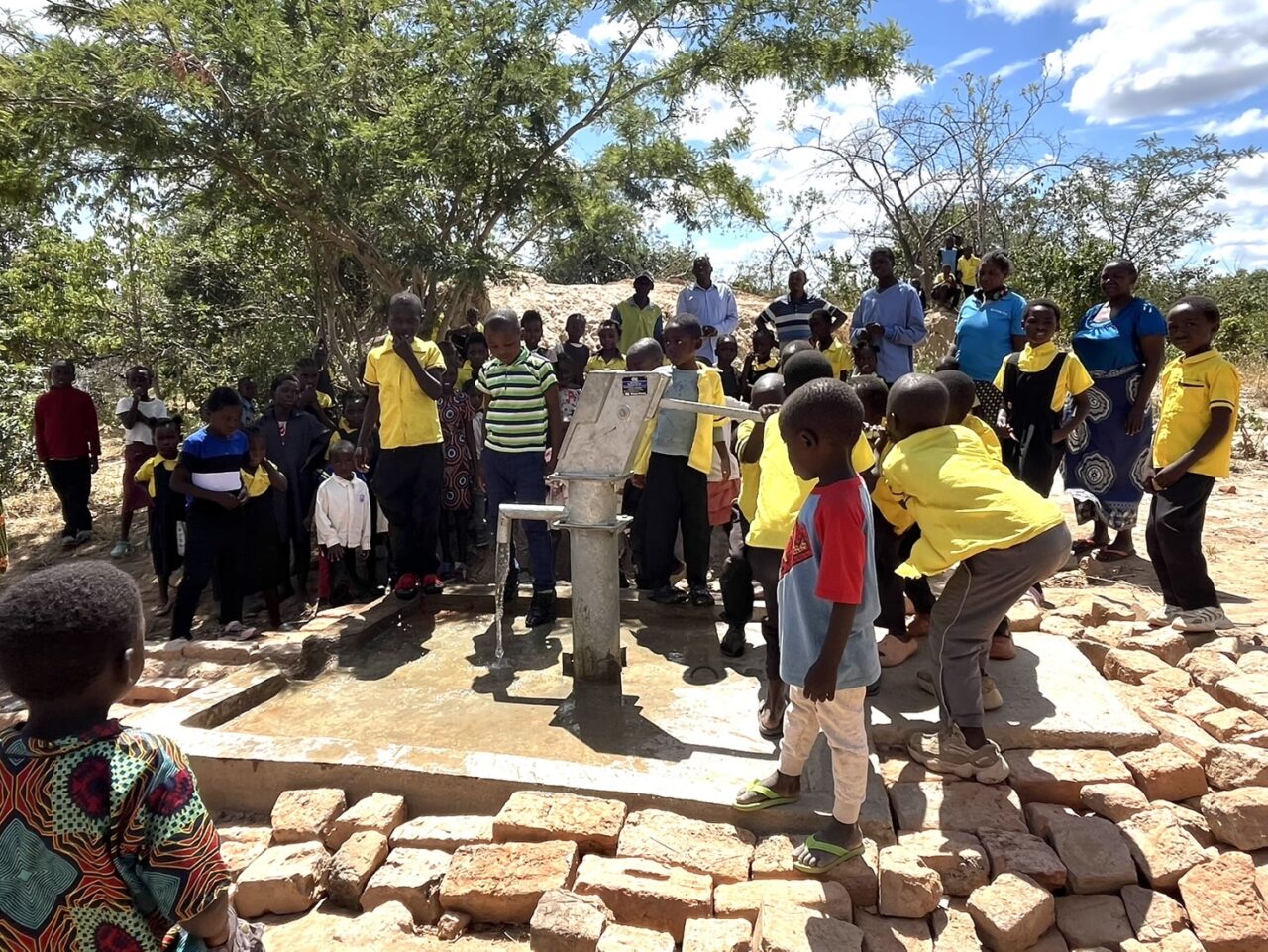
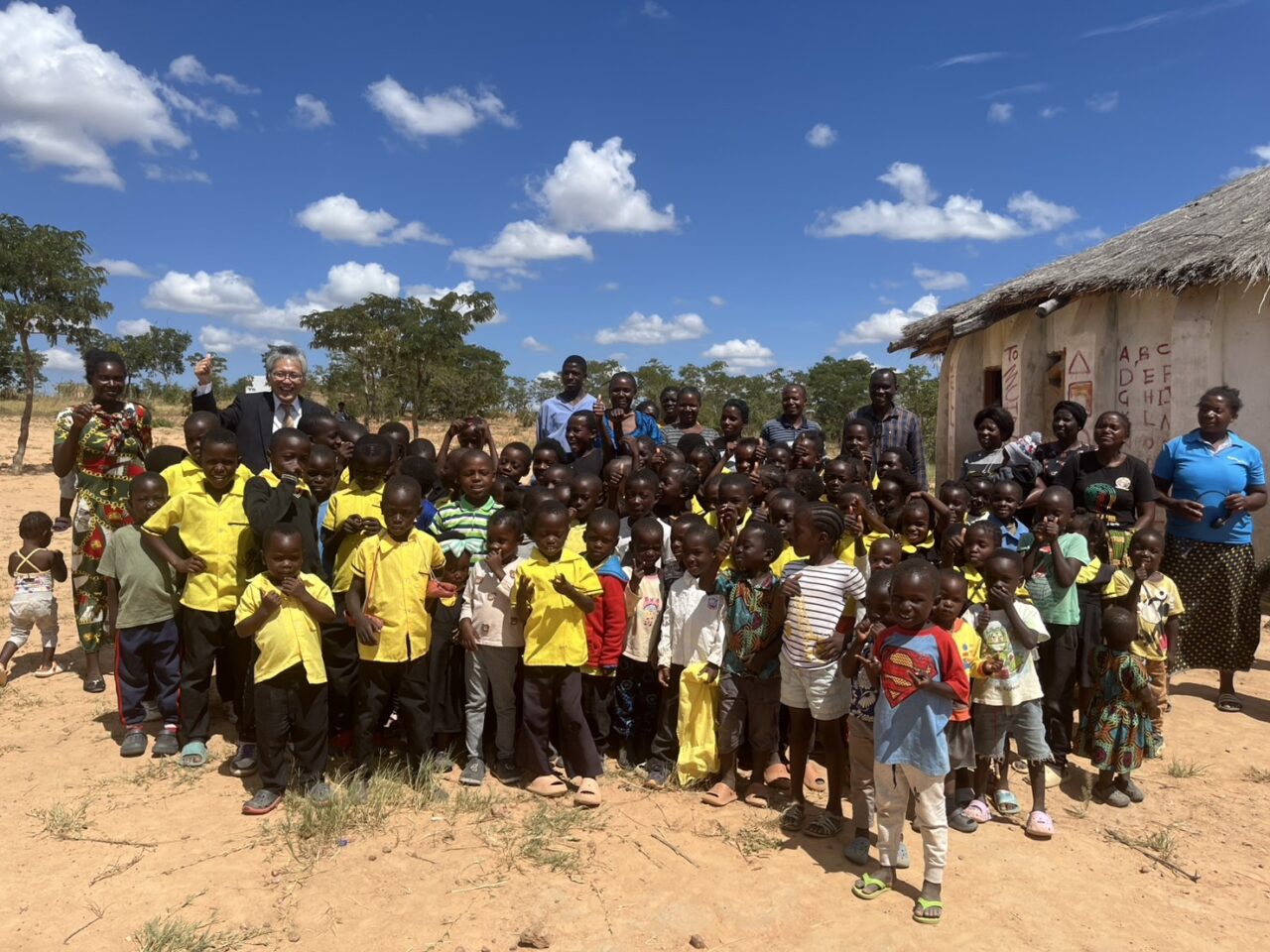
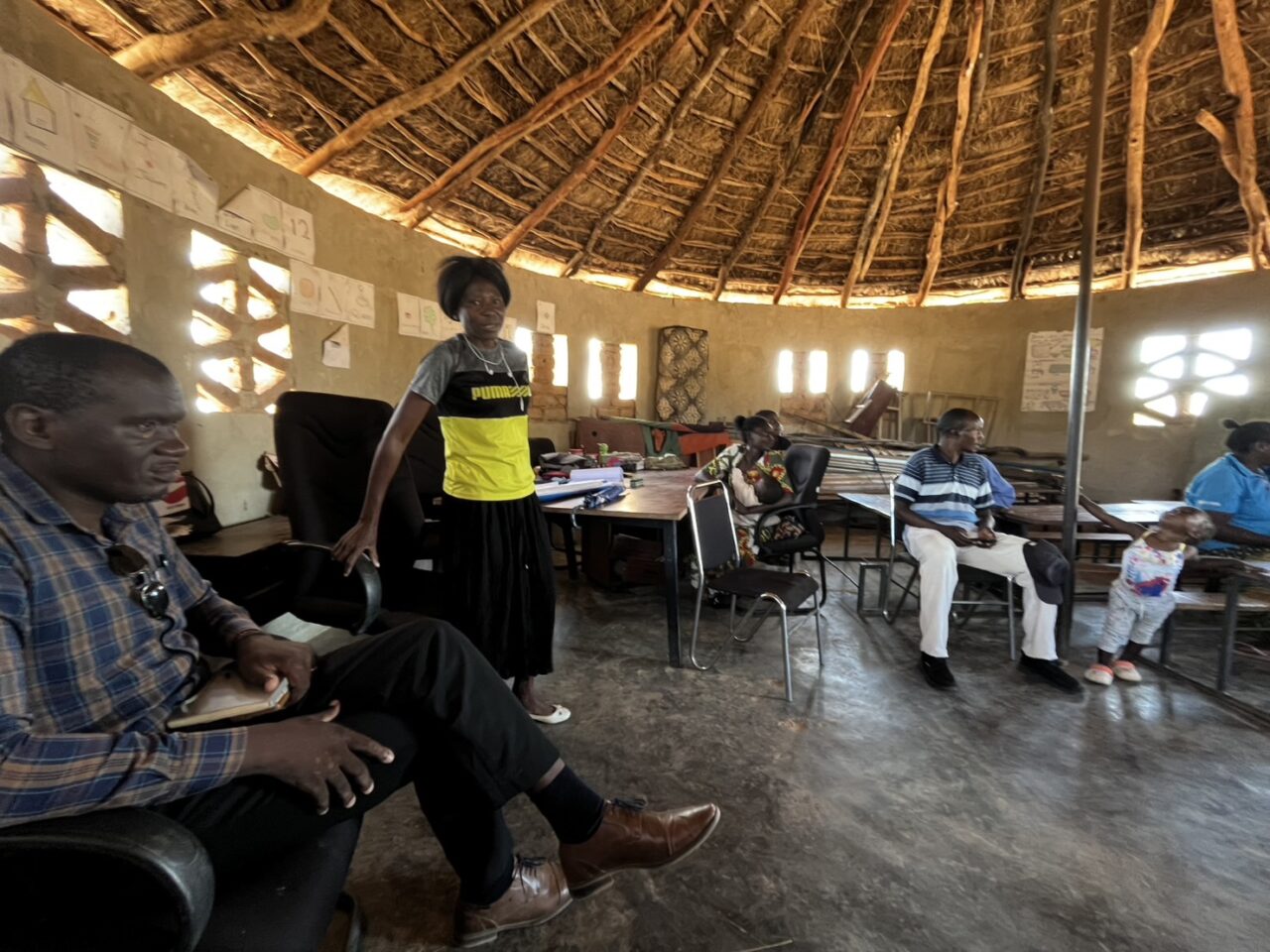
学校給食プログラム 統合報告書(2025年1-4月分)
<はじめに>
2023年から2025年にかけての農業シーズンは壊滅的な干ばつに見舞われ、ザンビア全116地区のうち84地区で98%が不作となった。政府は国家災害を宣言し、緊急人道支援を訴えた。ジンバ地区は84の災害地区のひとつである。
ジンバ地区は84の災害地区のひとつであり、いくつかのコミュニティでは100%不作であった。多年生水域はすぐに干上がり、コミュニティは弱体化した。大半の家族が食料と収入の安定を農作物の生産に完全に依存していたため、その結果、コミュニティ全体が代替案のない状況に陥った。この状況は、2024-2025年の雨季のパターンにより、2025年4月まで続くと予測された。以上のことから、コセブカ・コミュニティ財団(KCF)はTICOと協力し、この状況が学習者に及ぼすであろう影響について迅速な評価を行った。2024年3月の時点で、いくつかの学校では、干ばつによって引き起こされた食糧と収入の不安のために、出席率の低下と退学を記録していた。専門家、学校当局、地域住民による調査の結果、最も脆弱な3校において、就学、健康、ウェルビーイング、栄養支援を促進するための介入を導入することが決議された。しかし、資金面の制約から、最終的には1校を支援することになった。ムタバ・コミュニティ・スクールが選ばれたのは、その比較的な脆弱性によるものであった。給食プログラムは2024年の第3学期(9月-12月)から開始され、2025年の第1学期(1-4月)まで延長された。
<主な課題>
コミュニティが日々の食糧需要を満たすことができないため、ほとんどの子どもたちは食糧不足のために授業を欠席し、学校を退学する可能性が高かった。その結果、食糧不足は、食糧と生計を求める労働を含む、無数の虐待に子どもたちをさらすことになる。家族がバラバラになり、一緒に過ごす時間が少なくなる傾向がある。主な課題は以下の通り:
- 食糧と収入の不安-食糧不安は予測された期限を超えて続いている。これは、例年よりも早い時期に突然雨が止んだことが原因である。今年の雨は良かったが、突然の雨止みのため、ムタバ・コミュニティ周辺のほとんどの世帯ではトウモロコシが成熟しなかった。このことは、家族が今後も困難な時期に直面することを意味する。強調されているように、作物生産の失敗から生じる食糧不安は、収入不安を意味する。そのため、家族は依然として困難な時期を経験することになり、学校への出席率にも影響する可能性がある。
- 学校インフラの不足-学校は非常に深刻なインフラ問題を抱えている。現在、学校には草ぶき屋根の丸いシェルターが1つしかなく、文字通り全学年(幼児教育から4年生まで)のメイン教室となっている。今年から5年生に進級する予定だったが、教室のスペースがないため、子どもたちは他の学校に通わせなければならなかった。
- 限られたスタッフ-現在、学校は政府からの出向教師1名で運営されている。他の2人は無給のボランティア教師である。
<主なハイライト>
プロジェクトは2025年4月までの2学期間、ピーク時には130人の学習者に毎日食事を提供し、成功裏に実施された。地域社会は、毎日の食事の準備や配膳のボランティアを通じてプロジェクトを支援し、極めて重要な役割を果たした。
コミュニティのメンバーは、水汲みと薪汲みを交互に行い、プロジェクトを支援した。また、夜間の警備をボランティアで行う人もいた。
全体として、このプロジェクトは学習者の全般的な健康状態を評価した。2025年第1学期(2025年1月開始、4月終了)には、給食プログラムの効果を調べるため、全生徒の体重を測定した。終了時の体重比較では、平均で0.5~1kgの増加が見られた。これは、給食プログラムの効果と栄養価の高さを示している。
出席率の向上-給食プロジェクトの期間中、目覚ましい進歩があり、学校全体の成績も向上した。2学期の間、欠席は5回以下であった。学期あたり35人以上の欠席があったのと比較すると、記録的な高得点である。
同校はまた、TICOより井戸掘削・設置の支援も受けている。これにより、きれいな水と衛生設備へのアクセスが改善された。それまでは、学校は水を汲むために3km以上歩いて最寄りの井戸まで行かなければならなかった。学校敷地内に水があることで、今ではより多くの展望が開けています。一日中水が供給されるので、子どもたちは大喜びです。
<提言>
- 雨が降らず食糧難が続いていることから、学習者への食糧補給による継続的な支援の必要性が高まっている。コミュニティと教師は、この危機的状況が続く中、学習者が円滑に学習できるよう、継続的な支援を訴えている。
- インフラ支援-コミュニティは、進級クラスの学習者を吸収するための教室ブロックの建設に向けた支援を訴えている。
- 教師の支援-継続的な支援の一環として、リソースが許す限り、2人のボランティア教師への一時的な支援を検討するよう要請している。
<結論>
学校給食プロジェクトは大成功であった。ムタバ・コミュニティー・スクールの子どもたちは、過去2学期の間、政府からの大規模な支援がないコミュニティーの中で、必然的に給食を食べることができた。その結果、子どもたちは学期を通して進歩し、積極的に学習するようになった。さらに、このプロジェクトを通じて、学校は大規模な地域社会の参加と支援を受けている。学校当局は揺るぎない支援を続けており、将来の事業においても引き続き協力するよう訴えている。水道掘削プロジェクトは、同校の戦略的成長における大きな節目となった。2025年4月13日から15日にかけての中村哲郎氏の現地訪問は、主要な関係者と交流する素晴らしい機会となった。学校当局(地区教育局、地区委員、地区評議会事務局、ムタバ・コミュニティースクール)とのミーティングは、プロジェクトの実績について詳しく話し合う絶好の機会となった。
TICOの大きな支援に感謝する機会となりました。コセブカ・コミュニティ財団事務所での会合も素晴らしかった。皆様の貴重なご支援に感謝いたします。
作成者
パスウェル・ニャンベ
Introduction
Following the devastating drought season of the 2023-2025 agriculture season resulting in 98% crop failure across 84 of the 116 districts in Zambia, most household were reeling on the brink of unprecedented food insecurity. Government moved to declare a national disaster and appealed for urgent humanitarian assistance. Zimba District was among the 84 disaster districts
with 100% crop failure in some communities. Perennial water bodies quickly dried out and weakened the community. With the majority of families entirely dependent on crop production for food and income security, the resulting situation rendered the whole community without a fallback plan. This situation was projected to persist up to April 2025 subject to the 2024-2025 rain season pattern. In view of the above, Kocebuka Community Foundation in partnership with Tokushima International Cooperation undertook a rapid assessment of the likely impact of this situation on the learners. As early as March of 2024, some schools had recorded a decline in school attendance and drop out attributed to food and income insecurity induced by the drought. Following the conclusion of the survey informed by experts, school authorities and community members, it was resolved that an intervention to promote school attendance, health and wellbeing, and nutritional support be introduced in in three most vulnerable schools. However, due to funding limitations, it was finally resolved that one school be supported. Mutaba Community School was selected due to its comparative vulnerability. The feeding program commenced in the third term of 2024 and extended to the first term of 2025.
Key Challenges
With communities unable to meet their daily food needs, most children were most likely to miss classes and drop out of school due to food insecurity. Food insecurity by consequence subject children to a myriad of abuse including Labour in search of food and livelihood. Families tend to fall apart and spend little time together. Key challenges included:
• Food and income insecurity- the food insecurity has persisted beyond the projected timeline. This has been a result of the sudden rain stoppage earlier than the normal time. While the rains were better this year, the sudden stoppage resulted in maize not reaching maturity for most households around Mutaba Community. This means that families will still face another difficult time ahead. As highlighted, food insecurity arising from failed crop production means income insecurity. So families will still experience a difficult time which might likely affect school attendance.
• Lack of school infrastructure- the school has a very serious infrastructure problem. Currently, they only have one round grass roofed shelter which literally serves as the main classroom for all the grades (Early Childhood Education to grade Four). They were supposed to progress into grade 5 this year but children had to be sent to other schools due to lack of classroom space.
• Limited Staff- currently, the school is run by one government seconded teacher. The other two are Volunteer teachers who are not paid.
Key Highlights
The Project was successfully implemented providing daily meals to a peak of 130 learners every learning day for the two school terms ending April 2025. The Community played a pivotal role by supporting the project through daily volunteering for food preparation and serving.
Community members alternated to support the project by drawing water and fetching firewood. Others volunteered to provide night security.
Overall, the project scored on general well being and health of the learners. During the firtst term 2025 (ending this April 2025), weights were taken for all the pupils to determine the effect of the feeding program. The closing weight comparison indicated an increase of between 0.5-1 kgs in weigh average. This positively points to the effectiveness and nutritional value of the feeding
program.
Improved attendance- during the feeding project lifespan (2 terms) there was remarkable progress and overall school performance. Less than 5 absenteeism were recorded over a period of the three terms. A record high positive score compared to more than 35 absenteeism per term.
The school has also been supported with a Borehole. This has improved access to clean water and overall sanitation. Until then, the school had to walk more than 3kms to the nearest borehole for water. With water in the campus, more prospects are opening up now. Children are very excited with all water supply all day.
Recommendations
• The failed rains creating food insecurity extends the need for continued support to the learners with food supplementation. The Community and Teachers are appealing for continued support to enable the learners a smooth learning environment during this ongoing crisis.
• Infrastructure Support- the community is appealing for support towards the construction of a classroom block to absorb the learners in the progressive classes.
• Teachers Support- as part of the continued support appeal, there is a request to consider, resources allowing, temporal support to the two volunteer teachers.
Conclusion
The school feeding project has been a great success. Children at Mutaba Community School have had the necessarily support given their community setting without extensive government support to have meals during the last two terms. This resulted in their progression and active learning all through the terms. Additionally, the school has received massive community participation and support through this project. The school authorities remain steadfastly supportive and appeal for continued collaboration in future undertakings. The water drilling project was a great milestone in the strategic growth of the school. The visit by Mr. Tetsuro Nakamura from 13th April to 15th was a great occasion to interact with key stakeholders. Our meetings with the school authorities (District Education Office, District Commissioner, District Council Secretary, Mutaba Community School) were a great opportunity to discuss in-depth
project performance and an occasion to thank TICO for the great support. It was great meeting at Kocebuka Community Foundation Office too. We remain indebted to you for your invaluable support.
Prepared by
Passwell Nyambe.
学校給食プログラム 統合報告書(2024年9-12月分)
<前文>
コセブカ・コミュニティ財団(KCF)は、TICOと連携し、ザンビア南部ジンバ郡ムタバ・コミュニティースクールにおいて、2024年9月2日から12月6日まで学校給食プログラムを実施し、成功を収めました。
これは、2023年から24年にかけての気候変動による全作物不作に起因する食糧・所得不安を軽減するために開発された先行プロジェクト・コンセプトに従って実施された災害志向の共同ニーズ・アセスメントを受けたものである。
共同調査の結果、差し迫った食糧不安が、特に低所得世帯の学習者に最終的な影響を及ぼすことが示された。
コミュニティ・スクールは、主に低所得世帯の子供たちが地元で教育を受けるための、非公式の低所得コミュニティ主導の学校である。
コミュニティ・スクールは、主流の教育システムの一部ではあるが、最低限の採用レベルに達するまでは、一貫した助成金の支援は受けられない。
ムタバ・コミュニティ・スクールは、幼児教育(ECE)を提供しており、4年生まであり、学年全体で126人の学習者がいます。
KCFとTICOの間で正式に合意覚書(MoA)が締結された後、毎月800米ドルがKCFの口座に送金され、学校へ配送する食料品の調達が可能になりました。合計2400米ドルが2024年12月6日に終了する学校の3学期中に受領され、使用されました。
<給食内容>
学校当局およびコミュニティの代表者との協議の結果、子どもたちにはピーナッツバターと砂糖を混ぜたミールライス(挽いたトウモロコシの粉)を与えることが合意されました。
この混合食は、子どもの発育と発達に必要なタンパク質、炭水化物、エネルギーを供給することができます。
食事はすべて学校で用意されることが合意され、教師が監督する日替わりプログラムが引かれ、保護者が来て食事を準備することになりました。
合計52人の保護者が、全学期、合計65日の学習日の食事の準備に参加しました。
また、保護者は食事の準備や学習期間中の子どもたちの飲料用の水を汲まなければなりませんでした。
<主な成果>
- 出席率の向上-給食プログラムがなかった前学期と比較すると、欠席の頻度が学年全体で全般的に高いことが観察された。
ほとんどの場合、欠席の理由は空腹であった。
しかし、今学期は病気による欠席はほとんどなく、過去最高の出席率を記録した。 - 学校スポーツの増加- 子供たちは、授業後、特に給食の前に、活発なスポーツ活動をしていることが観察された。
子どもたちが学校から立ち去ることが多かった前学期とは異なり、前学期はいつでも子どもたちが何らかの形でスポーツ活動に参加している姿が見られた。 - 学校への再入学-給食プログラムのおかげで、退学していた生徒の何人かが授業を再開した。
- 学級成績の向上-学期末の成績分析と学級成績評価では、前学期の55%から70%へと15%の向上が見られた。
- コミュニティと教師の関係の改善-給食プログラムを通じて、保護者が学校活動に深く関わるようになった。
男性は、食糧を確保するための学校の倉庫を建設している。
女性は月曜日から金曜日まで一貫して給食の準備に参加している。 - 退学者ゼロ-飢えが原因で退学した子どもはいない。
この状況は、この地域のほとんどのコミュニティで記録されている。 - 時間厳守-給食プログラムのおかげで、子どもたちはいつも授業に間に合うように登校しました。
<課題>
- 水-コミュニティ・スクールには水源がありません。学校から3キロのところにあるコミュニティーの井戸は、コミュニティーのメンバーや家畜が水を共有しなければなら
ないため、混雑しています。 - トウモロコシの価格-トウモロコシの価格は、その希少性から着実に上昇している。
新年を迎え、さらに高騰することが予想されます。 - 電力不足-電力が不安定なため、ミールライスを粉砕するのに苦労し、その結果、配達スケジュールに影響を及ぼしている。
しかし、1日も欠かすことなく供給することに成功した。
<今後の見通し>
- 飢餓の状況は、特に来年にエスカレートすることが予想されます。
例年であれば、雨季は10月に始まるが、現在までに雨は降っていません。
食糧不安は悪化する可能性が高い。
<提言>
学校給食プログラムは、教室の壁を越えて飢餓状況を緩和することに成功しています。
家族からは、給食プログラムのおかげで1日の家での食物消費量が減ったと報告されています。
学校に通う子どもたちのことを心配する代わりに、学校に通う子どもたちに食事を与えることで、家庭の家族間で食料が配給されました。
したがって、TICOの支援は、家族の食費を削減し、子どもたちが学校に通い、授業成績を向上させるのに役立っているのです。
記録されたプラスの成果を持続できるよう、このプログラムを継続することを推奨します。
<結論>
給食プログラムは、壊滅的な飢餓の中で学習を継続することに貢献しています。
そうでなければ学習の機会、ひいては運命を失っていたかもしれない子どもたちが、このプログラムによって救われたのです。
私たちは、災難が回避されたという地域住民の気持ちを改めて実感しています。
<逸話>
- 地区教育委員会事務局長は次のように語っています。「低所得世帯の学習者たちにとって、今学期は非常に困難な時期でした。雨季に雨が十分に降らなかったことによる食糧難のため、農村部の学校では欠席率が高くなっています。TICOとKCFの素晴らしい取り組みに感謝します。」
- あるご父兄からの声です。「このプロジェクトが始まってから、私の負担は軽減されました。毎日食べ物を探す代わりに、子どもたちが学校で食事をしているので、私は
仕事に集中することができています。」 - 校長は以下のように述べています。「私は仕事がやりやすくなりました。生徒や子どもたちが注意深く、積極的に授業に参加しているからです。」
作成者:デボラ・ムクロ
校閲:パスウェル・ニャンベ
Preamble
Kocebuka Community Foundation (KCF) in partnership with Tokushima International Cooperation (TICO) has successfully implemented a School Feeding Program from September 2024 to 6th December at Mutaba Community School, Zimba District, Southern Province, Zambia.
This followed a joint disaster-oriented needs assessment carried out following a prior project concept developed to mitigate the Climate Change induced food and income insecurity arising from a total crop failure during the season 2023-24.
Collaborative findings indicated an imminent food insecurity that would ultimately impact on learners especially from low-income households.
Community schools are predominantly informal low-income community initiatives cratering for children from low-income households to access education within their localities.
While being part of the mainstream education system, community schools do not receive consistent grant support until such a time when they attain the minimum adoption level.
Mutaba Community School offers Early Childhood Education (ECE) and extends up to grade 4.
It has a total of 126 learners across the grades.
Following the official signing of the Memorandum of Agreement (MoA), between KCF and TICO, monthly advance of USD 800 were successfully remitted to KCF account to allow for the procurement of food commodities for onward delivery to the school.
A total of USD 2400 dollars was successfully received and spent during the school third term ending December 6th
2024.
Feeding Content
In consultation with school authorities and community representatives, it was agreed that children be fed with meal Rice (ground corn meal) mixed with Peanut butter and sugar.
This food mixture provides essential proteins, carbohydrates and energy requirements to allow for
child development and growth.
All the meals were agreed to be prepared at the school.
A daily rotational program supervised by teachers was drawn where parents would come and prepare the meals.
A total of 52 parents participated in preparing meals for the whole term with a total of 65 learning days.
Parents had also to draw water for meals preparation and drinking for children during the learning period.
Key outcomes.
• Improved school attendance- it was observed that compared to last term when there was no feeding program, the frequency of absenteeism was generally high across the grades.
With children reporting hunger as the reason in most cases for their absence.
However, this term recorded the highest ever school attendance with very few absenteeism related to sickness.
• Increased School sports- Children were observed to have engaged in active sporting activities after lessons specially before feeding.
Unlike last term when children would just walk away from school, at any given time last term, children could be seen involved in some form of sport activities.
• School re-ntry- some pupils who had dropped out school have resumed classes due to the feeding program.
• Improved class performance- End of term results analysis and classroom performance assessment indicated an increment of 15% from last term`s 55% to 70%.
• Improved Community Teachers relationship- parents have been deeply involved in the school activities through the feeding program.
Men have been building the school storage room where food supplies will be secured. Women have consistently been participating the meals preparation Monday through Friday.
• No Drop Out- no child has dropped out school due to hunger. A situation that has been recorded in most communities across the region.
• Timeliness- children are always in time for the lessons due to the feeding program.
Challenges
• Water- the community school has no water source. The community borehole located 3 kms from the school is sometimes busy as community members and their animals must share water.
• Maize Price- the maize (Corn) price has been steadily rising due to its scarcity around.
This is expected to get even higher as we go into the new year.
• Electricity shortage- we have had challenges for grinding meal rice due to erratic electricity thereby affecting delivery timelines. However, we successfully managed to
supply without missing a day.
Opportunity.
• The hunger situation is expected to escalate especially in the coming year. Under normal circumstances, rain season commences in October, to date, no rains have fallen and this may signal another troublesome year.
The food insecurity may most likely worsen.
Recommendation.
The school feeding program has successfully mitigated the hunger situation beyond the classroom walls.
Families have reported lowering their daily consumption rates due to the feeding program. Instead of worrying about the school going children, food is rationed among
the family members at home as those in school are fed.
Therefore, TICO supporting is helping families lower their food expenses and allowing children to attend school and have improved classroom performance.
We recommend the continuation of this program to allow for the sustainability of the recorded positive outcomes.
Conclusion.
The feeding program has contributed to the continuation of learning in the midst of devastating hunger.
Children who otherwise could have lost their learning opportunity and ultimately destiny have been preserved by this program.
We re-echo the community feeling that a
disaster has been averted.
Anecdotes.
The District Education Board Secretary has the following to say, “this has been a very difficult term for our learners from low-income households.
Due to the failed rain season and the resultant food insecurity, rural school record a higher absenteeism rate.
We thank TICO and KCF
for this great initiative”
One parent had the following to say, “My burden was lifted when this project started.
Instead of looking for food every day, I concentrate on my work as the children are fed at school” The School Headteacher,” I work has been made easier,pupils/children are alert, attentive and actively participate in lessons”.
Prepared by:Deborah Mukulo
Reviewed by :Passwell Nyambe.
KCFのMs Deborah Mukuloさんからの報告
今日(9/13)、モニタリングに行ってきました。子どもたちがご飯を楽しんでいる様子を見て、とても嬉しくなりました。みんな笑顔でいっぱいでした。
子どもの数は先週の52人から89人に増えており、このプロジェクトが子どもたちに良い影響を与えていることが明らかです。
Today (13th of September 2024) I went for monitoring,i was happy to see how children were enjoying their meal rice and they were all smiles.
The number of children has risen from 52 of last week’s report to 89 it’s a clear indication that the project is positively impacting the learners.
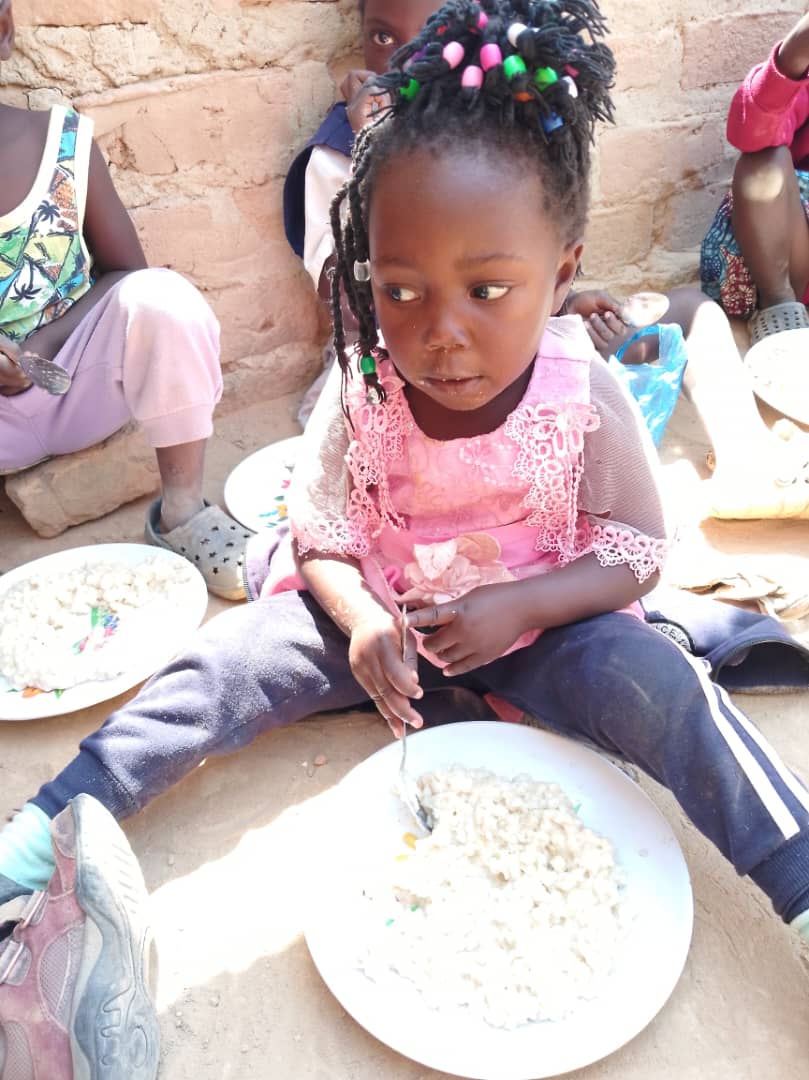
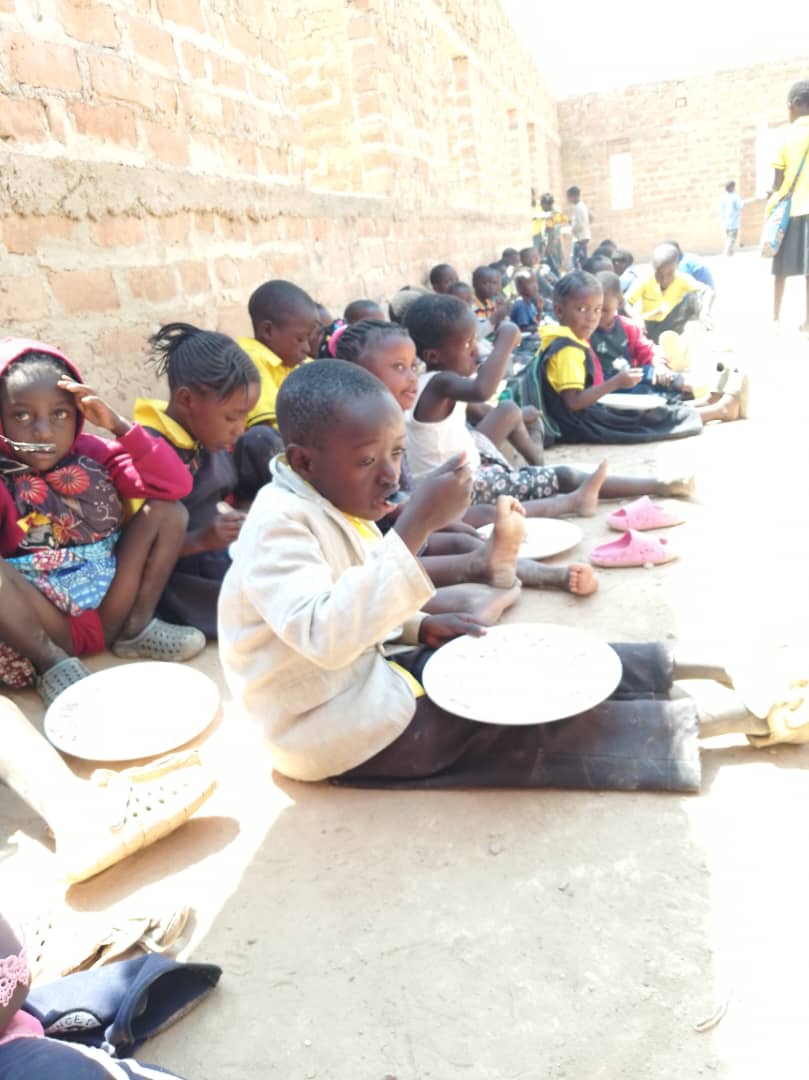
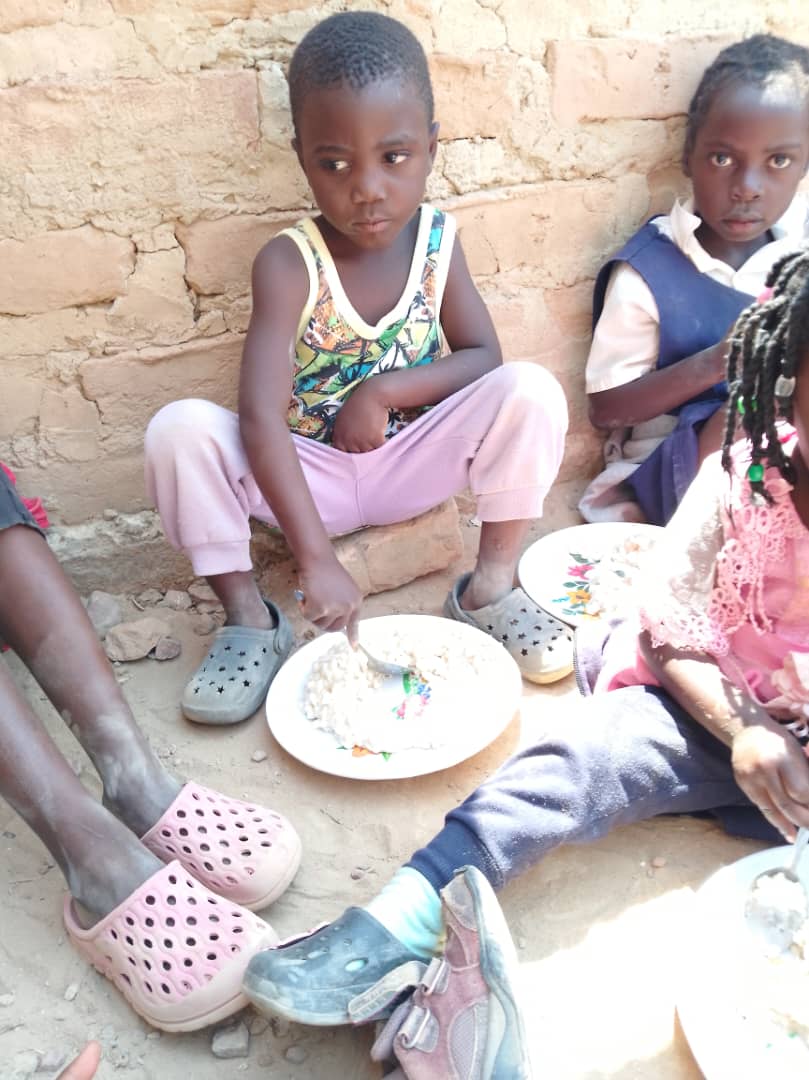
学校給食提供開始!
学校給食の提供が2024年9月4日に始まりました!停電のため、給食用の米の粉砕がうまくいかず、遅れをとってしまいましたが、今のところうまくいっています。
通常、開校の最初の週は子どもたちの出席が少ないのですが、来週になるにつれて増え続けています。
The feeding program started on 4th of September 2024,we had a challenges in grinding the meal rice due to power cut therefore led us to a delay, but so far so good we are managing.
The children were 52 all together, usually the first week of opening schools children are few in attendance, they keep increasing as we slide to next week.
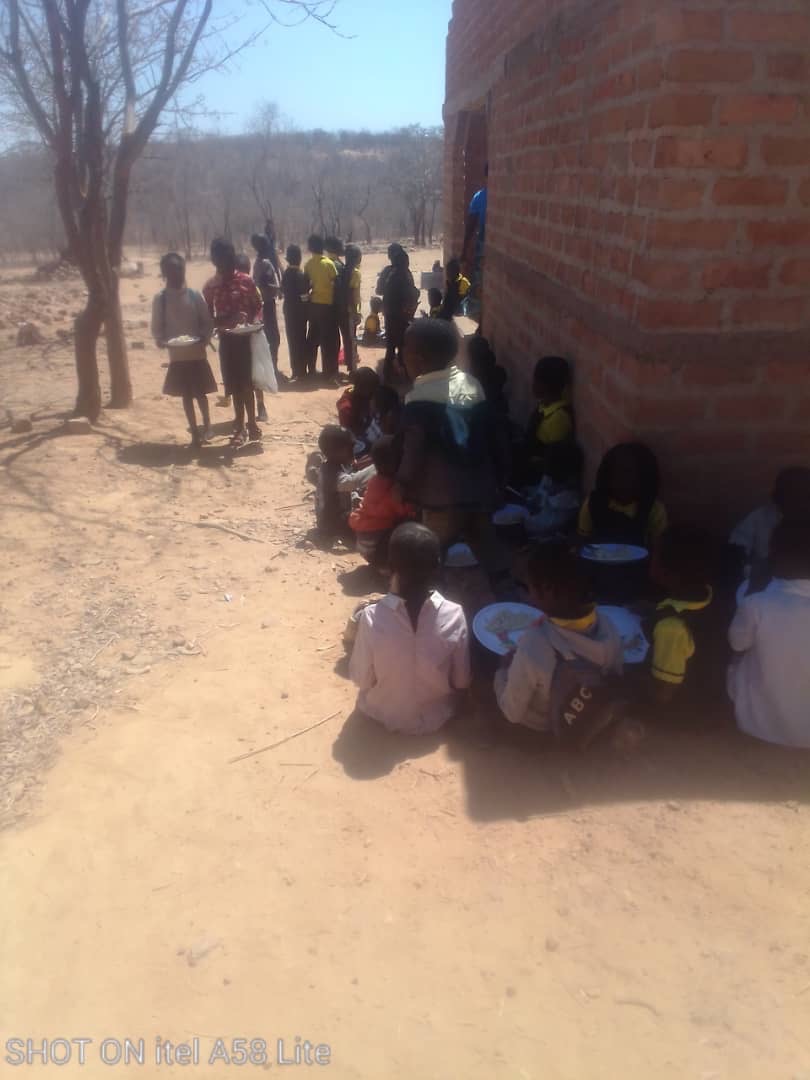
ザンビア干ばつ被害緊急支援
国際協力NGO・特定非営利活動法人TICO(本部事務局:徳島県吉野川市、代表:吉田修)は、エルニーニョの影響による南部アフリカ地域で発生した史上最悪規模の干ばつにより、水源が枯渇し、深刻な食料危機に直面している子どもたち対する人道支援としてザンビア共和国、南部州Zimbaで活動する現地NGO Kocebuka Community Foundationと学校給食の提供について業務委託契約を締結し、現地のCommunity School(政府の援助がない学校)において学校給食の提供を開始いたします。給食の提供は、次の収穫時期を迎える2025年4月までを計画しております。
